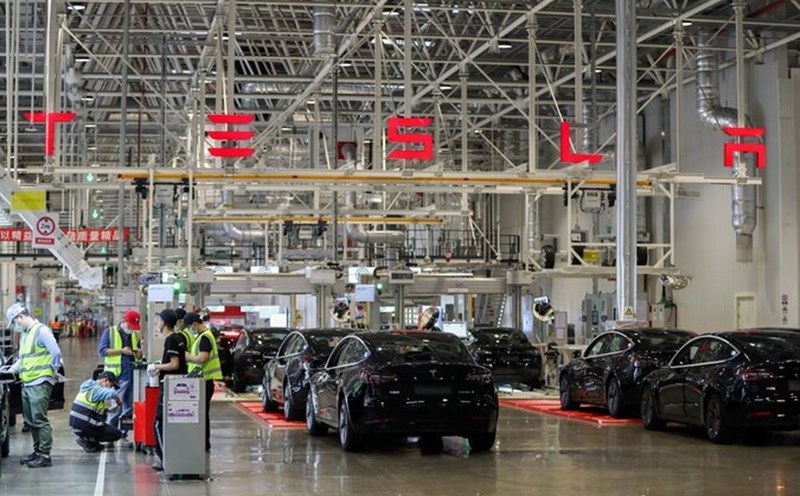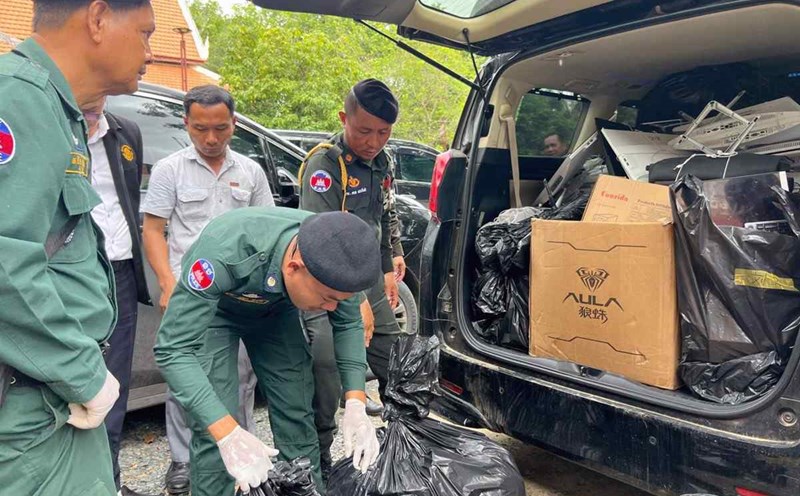Can't stay silent
According to information from Vingroup, social media accounts have fabricated and distorted many contents, focusing on 4 groups: Financial situation, quality and product origin, legal issues, as well as personal information of the group's leaders. Notably, there are rumors that the group owes 800,000 billion VND, is about to go bankrupt, while the public financial report shows that the debt is only about 283,000 billion VND, the debt/equity ratio is at a safe level. Some accounts also listed VinFast cars and electric motorbikes as Chinese goods "overlapping" Vietnamese goods, although the localization rate has reached 60%. In addition, fabricated rumors about Chairman of the Board of Directors Pham Nhat Vuong and false information about Vingroup employees were also spread.
Mr. Nguyen Viet Quang - Vice Chairman and General Director of Vingroup - affirmed: "We cannot keep quiet to let some people arbitrarily violate the law, fabricate, lead the public without reality, and undermine the reputation and dignity of organizations and individuals. The lawsuit not only protects Vingroup's interests but also fights for the truth, for a civilized society, the rule of law".
Currently, Vingroup has drawn up documents as evidence, worked with domestic and foreign lawyers, and sent notices to the embassies for handling according to the laws of each country.
In the digital age, the speed of information dissemination is unprecedented. Every day, millions of shares and comments on social networks create a continuous flow of information, but there are many "toxic flows" from fake news and untrue news. Fake news and false information not only affect social life, but also become a serious threat to business operations, causing real economic damage, real reputation and a real trust crisis.
At the end of 2024, the Vietnamese stock market continuously witnessed shocks from false rumors. GELEX Group (code GEX) and Eximbank are typical examples. Since GELEX bought more shares and became a major shareholder at Eximbank, many social media accounts have begun to release slanderous information about the relationship between the two sides. Immediately, GEX shares decreased by nearly 18%, with a market capitalization of more than VND 2,600 billion. At the same time, Eximbank was also struggling with a fake document about the "risk of system collapse", causing EIB shares to sell a record of nearly 100 million units in just one session. The bank had to issue a statement affirming that operations were still safe and stable, financial indicators were high and transparent, but the negative psychological impact was still widespread. Immediately after that, the enterprise must issue a notice of false information, affecting the enterprise.
Not only the financial - banking sector, but the consumer goods industry also suffered from the big waves of fake news. For example, the Laura Coffee brand once became the focus when two TikTok accounts posted a fabricated video that the product contained Aspartame that caused cancer. These clips attract millions of views, tens of thousands of shares, causing consumers confusion and serious decline in confidence in the product. The company representative must submit a petition to the competent authority, and at the same time confirm that Aspartame is an additive on the list permitted by the Ministry of Health. Fake information not only offends our reputation and honor but also causes confusion for consumers, directly affecting socio-economic development, the business representative was upset.
Protecting trust in society
Resolution 68-NQ/TW of the Politburo on private economic development clearly stipulates: "Bringing harassment, negativity, and providing false and inaccurate information that affects businesses and entrepreneurs".
In fact, the unpredictable power of fake news and false information in the digital environment, where crowd psychology and social network algorithms can multiply the negative impact in just a few hours, causing widespread impact.
At the National Assembly in November 2024, Politburo member and Minister of Public Security Luong Tam Quang warned: "The consequences of fake news and false information are unpredictable, causing many serious consequences, becoming a major threat to the socio-economic situation, even directly threatening national sovereignty and global security". The Minister of Public Security emphasized that the consequences in the economic sector are especially obvious in securities, finance, and real estate, with incidents causing capital losses of thousands of billions of VND.
From the perspective of experts, Mr. Dau Anh Tuan - Member of the Standing Committee, Deputy General Secretary of the Vietnam Federation of Commerce and Industry (VCCI) - commented: "If a business is doing business normally, just a fake news like a cancer product or a leader is arrested, the consequences immediately occur. Stocks have fallen, customers have turned their backs, banks have tightened credit. Fake news but the consequences are real".
Lawyer Nguyen Danh Hue believes that it is necessary to urgently amend the law on compensation for damages: "If a business is spread with false rumors, it will prove that the damage is extremely difficult. Sometimes in court, "the cheeks are swollen". There must be regulations to only need to prove the actual damage for the court to accept.
On the other hand, the management agency has also made many efforts to create a legal "shield". In 2024, Vietnamese authorities coordinated with Facebook to block and remove 10,092 articles, 349 accounts, 16 groups, 153 violating pages; Google blocked and removed 6,467 videos and 36 YouTube channels, TikTok blocked and removed 1,274 videos and 294 accounts. Forces of spreading false information are currently punished according to Decree 15/2020/ND-CP, the highest level is up to 70 million VND; serious cases can be prosecuted for criminal liability for the crime of "Slander", the crime of "Abusing democratic freedoms to infringe upon the interests of the State, the legitimate rights and interests of organizations and individuals" under the Penal Code with a penalty of up to 7 years in prison.
However, many experts frankly admit that the penalty level is not enough to deter, it is necessary to add stronger dinh and sanctions to protect businesses.
But first of all, businesses must have a self-defense and quick response mechanism. Media expert Le Quoc Vinh emphasized: "There is nothing better than the information channel of the enterprise itself. I have to build that system, make it a place where the public comes first when they need to understand me, instead of reading unofficial sources. A communication crisis handling process, a specialized department monitoring social networks, and transparency in business operations are tools to help businesses protect themselves from the storm of fake news and false information.
In parallel with the responsibility of the State and businesses, each citizen also needs to be a "smart user" in the digital age. The Law on Cyber Security clearly stipulates that the act of posting or sharing false information that causes public confusion is a prohibited act. However, in reality, many people still accidentally press the share button out of curiosity or following the crowd mentality.
Raising legal awareness, forming a civilized online culture, and not providing false information is the social responsibility of every citizen.
The fight against fake news and false information cannot therefore rely on just one individual force. It requires the synchronous participation of all three pillars: State - Enterprise - People. The State completes the legal corridor, strictly handles and orients communication. Enterprises are transparent, proactively respond quickly and closely coordinate with authorities. People improve digital skills, do not share unverified information and contribute to building a healthy digital environment.
Fake news not only distorts the truth, but can also destroy trust. And when faith is eroded, restoration will be extremely difficult. Protecting businesses from fake news is not only about protecting economic interests, but also protecting the foundation of social trust - a core factor for sustainable development in the digital age.











